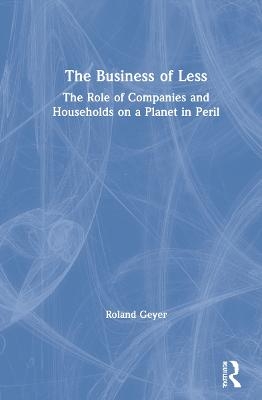
The Business of Less
The Role of Companies and Households on a Planet in Peril
Seiten
2021
Routledge (Verlag)
978-0-367-75583-6 (ISBN)
Routledge (Verlag)
978-0-367-75583-6 (ISBN)
The Business of Less rewrites the book on business and the environment. Promoting the concepts of ‘net green’ and ‘labor, not materials’, the book provides a roadmap for businesses and for every household, to a world in which human prosperity and a healthy environment are no longer irreconcilable.
The Business of Less rewrites the book on business and the environment.
For the last thirty years, corporate sustainability was synonymous with the pursuit of ‘eco-efficiency’ and ‘win-win’ opportunities. The notion of ‘eco-efficiency’ gives us the illusion that we can achieve environmental sustainability without having to question the pursuit of never-ending economic growth. The ‘win-win’ paradigm is meant to assure us that companies can be protectors of the environment whilst also being profit maximizers. It is abundantly clear that the state of the natural environment has further degraded instead of improved. This book introduces a new paradigm designed to finally reconcile business and the environment. It is called ‘net green’, which means that in these times of ecological overshoot businesses need to reduce total environmental impact and not just improve the eco-efficiency of their products. The book also introduces and explains the four pollution prevention principles ‘again’, ‘different’, ‘less’, and ‘labor, not materials’. Together, ‘net green’ and the four pollution prevention principles provide a road map, for businesses and for every household, to a world in which human prosperity and a healthy environment are no longer at odds.
The Business of Less is full of anecdotes and examples. This brings its material to life and makes the book not only very accessible, but also hugely applicable for everyone who is worried about the fate of our planet and is looking for answers.
The Business of Less rewrites the book on business and the environment.
For the last thirty years, corporate sustainability was synonymous with the pursuit of ‘eco-efficiency’ and ‘win-win’ opportunities. The notion of ‘eco-efficiency’ gives us the illusion that we can achieve environmental sustainability without having to question the pursuit of never-ending economic growth. The ‘win-win’ paradigm is meant to assure us that companies can be protectors of the environment whilst also being profit maximizers. It is abundantly clear that the state of the natural environment has further degraded instead of improved. This book introduces a new paradigm designed to finally reconcile business and the environment. It is called ‘net green’, which means that in these times of ecological overshoot businesses need to reduce total environmental impact and not just improve the eco-efficiency of their products. The book also introduces and explains the four pollution prevention principles ‘again’, ‘different’, ‘less’, and ‘labor, not materials’. Together, ‘net green’ and the four pollution prevention principles provide a road map, for businesses and for every household, to a world in which human prosperity and a healthy environment are no longer at odds.
The Business of Less is full of anecdotes and examples. This brings its material to life and makes the book not only very accessible, but also hugely applicable for everyone who is worried about the fate of our planet and is looking for answers.
Roland Geyer is Professor of Industrial Ecology at the University of California, Santa Barbara. His work has been covered widely in the media, including worldwide appearances on radio and television shows. Learn more about Roland, his work, and its impact on www.rolandgeyer.com.
1. Why Less? 2. A Brief History Of Business And The Environment 3. It’s Not Easy Being Green When You’re Color Blind 4. The Problem With Eco-Efficiency 5. Why Win-Win Won’t Work 6. The Business Of Less 7. Again 8. Different 9. Less 10. Labor, Not Materials 11. Net Green For Business 12. Net Green For Households
| Erscheinungsdatum | 08.09.2021 |
|---|---|
| Zusatzinfo | 1 Tables, black and white; 7 Halftones, black and white; 7 Illustrations, black and white |
| Verlagsort | London |
| Sprache | englisch |
| Maße | 156 x 234 mm |
| Gewicht | 371 g |
| Themenwelt | Naturwissenschaften ► Biologie ► Ökologie / Naturschutz |
| Technik ► Umwelttechnik / Biotechnologie | |
| Wirtschaft ► Betriebswirtschaft / Management ► Marketing / Vertrieb | |
| Wirtschaft ► Volkswirtschaftslehre ► Mikroökonomie | |
| ISBN-10 | 0-367-75583-1 / 0367755831 |
| ISBN-13 | 978-0-367-75583-6 / 9780367755836 |
| Zustand | Neuware |
| Haben Sie eine Frage zum Produkt? |
Mehr entdecken
aus dem Bereich
aus dem Bereich


